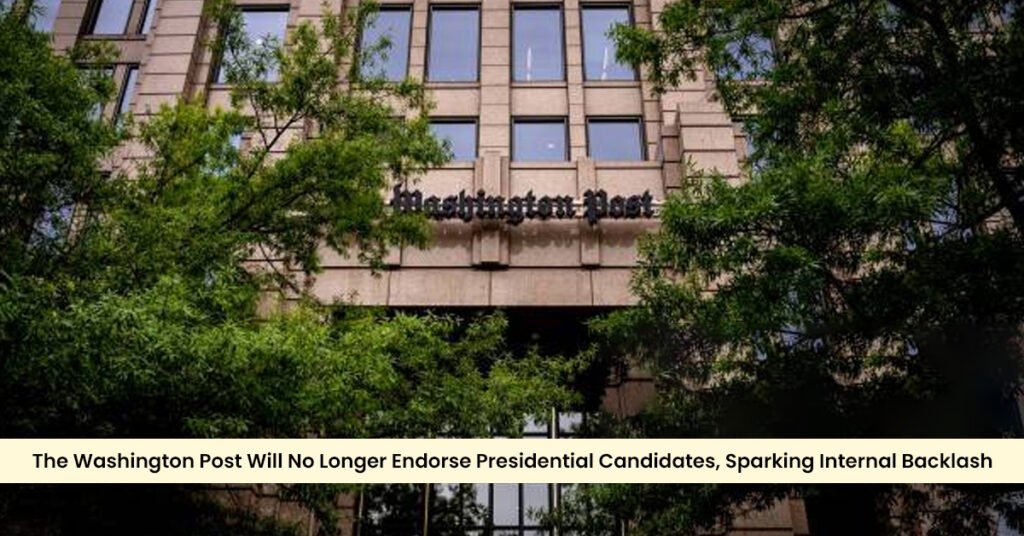For the first time in decades, The Washington Post announced it will not endorse a candidate in the upcoming presidential election—or in any future ones. The newspaper’s publisher, Will Lewis, shared the decision on Friday, which has since triggered intense reactions from within the paper’s staff.
In a public statement, Lewis explained, “We are returning to our roots of not endorsing presidential candidates. This is not about supporting or condemning any candidate, nor is it an abdication of responsibility. It’s about holding true to the values that define The Post—character, courage, respect for the rule of law, and a deep commitment to human freedom.”
Behind the scenes, however, the decision has stirred frustration and outrage among Post staffers. A source revealed to CNN that the paper’s editorial team had drafted an endorsement for Vice President Kamala Harris, which was ready for approval. However, the draft never made it to the board, and staff members felt blindsided.
“This came as a complete shock,” said a person familiar with the discussions. Some on the editorial board are furious, and there is talk among employees of drafting an open letter to publicly criticize the move.
The Post has endorsed a presidential candidate in every election since the 1980s, but according to two sources cited by the newspaper, this year’s decision came from the top—Amazon founder and Post owner Jeff Bezos.
Former Post executive editor Marty Baron, known for steering the paper through its Pulitzer Prize-winning coverage of the January 6, 2021, Capitol attack, did not hold back. In a sharp critique posted on social media, Baron called the move “cowardice, with democracy as its casualty.”
“Donald Trump will take this as a green light to further intimidate Bezos and others,” he wrote. “This is a spineless decision by a paper once celebrated for its courage.”
Baron’s tenure at the paper was marked by its adoption of the slogan, Democracy Dies in Darkness, during Trump’s presidency—an era when tensions between Trump and Bezos were at their peak. Trump regularly attacked both Bezos and the Post, labeling it the “Fake News Washington Post” and Amazon’s “chief lobbyist.” Bezos himself, as Baron disclosed in his memoir Collision of Power, played a role in shaping the paper’s now-iconic slogan.
Unsurprisingly, some of the paper’s editorial staff now feel betrayed. “We are furious,” said one writer. Another staff member expressed disappointment, saying, “Democracy doesn’t die in darkness—it dies when people consent to a fascist’s whims.”
The fallout follows a similar controversy at The Los Angeles Times, where owner Patrick Soon-Shiong blocked an endorsement for Kamala Harris, leading to the resignation of three editorial board members.
In recent years, other major media organizations have also scaled back their endorsements. McClatchy and Alden Global Capital, which own newspapers nationwide, have stepped away from the practice, and The New York Times announced earlier this year it would no longer endorse candidates in local races. Yet, the Times did endorse Harris, calling her “the only patriotic choice for president.”
Back at the Post, reactions have been mixed. Some journalists acknowledge the move might align with shifting times, but many are frustrated by how the decision was communicated. “I’m actually okay with not endorsing,” said one journalist anonymously, “but the timing and rollout are just awful. If you’ve been following the Post’s reporting over the years, you probably don’t need the editorial board to tell you what to do.”
Robert Kagan, a veteran editor-at-large, resigned in protest, and Pulitzer Prize-winning editor David Maraniss summed up the sentiment of many at the paper: “The paper I’ve loved working at for 47 years is dying in darkness.”
With emotions running high, the Post now finds itself at a crossroads. In abandoning endorsements, the paper hopes to emphasize its commitment to factual reporting and ethical journalism. Yet, for many inside the newsroom, the decision feels like a departure from the very ideals that once set The Washington Post apart.

